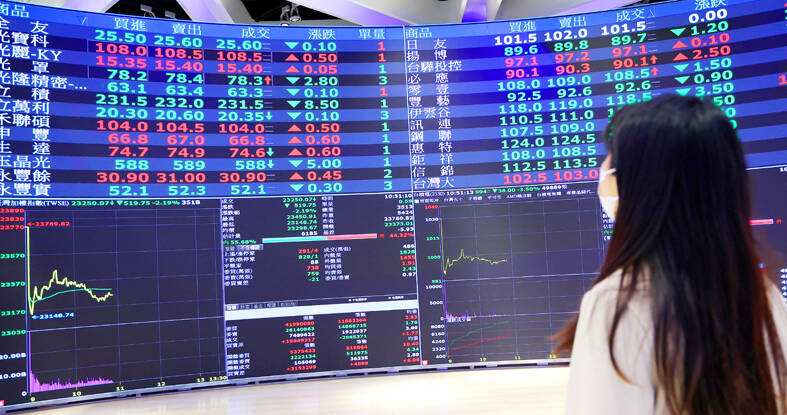Taipei is today suspending work, classes and its US$2.4 trillion stock market as Typhoon Gaemi approaches Taiwan with strong winds and heavy rain.
The nation is not conducting securities, currency or fixed income trading, statements from its stock and currency exchanges said.
Authorities had yesterday issued a warning that the storm could affect people on land and canceled some ship crossings and domestic flights.

Photo: CNA
Taiwan Semiconductor Manufacturing Co (TSMC, 台積電) expects its local chipmaking fabs to maintain normal production, the company said in an e-mailed statement.
The main chipmaker for Apple Inc and Nvidia Corp said it has activated routine typhoon alert preparations at all fabs, including placing emergency response teams on standby.
Over the past few days, Gaemi traveled past the Philippines, which placed northern parts of its main Luzon island on alert.
Taiwan’s market suspension comes after volatile trading over the past few days, with the benchmark TAIEX nearing a technical correction after investors took profits from the artificial intelligence frenzy.
Taiwanese shares yesterday staged a strong technical rebound after plunging a session earlier, as investors took cues from an overnight rally on Wall Street to pick up bargains on the local main board, dealers said.
The TAIEX ended up 614.85 points, or 2.76 percent, at 22,871.84, with TSMC, the most heavily weighted stock on the local market, gaining 4.26 percent as worries eased over geopolitical tensions related to the possibility of former US president Donald Trump securing a second term.
TSMC’s rise contributed about 320 points to the TAIEX’s gains, dealers said.
Additional reporting by CNA

Macronix International Co (旺宏), the world’s biggest NOR flash memory supplier, yesterday said it would spend NT$22 billion (US$699.1 million) on capacity expansion this year to increase its production of mid-to-low-density memory chips as the world’s major memorychip suppliers are phasing out the market. The company said its planned capital expenditures are about 11 times higher than the NT$1.8 billion it spent on new facilities and equipment last year. A majority of this year’s outlay would be allocated to step up capacity of multi-level cell (MLC) NAND flash memory chips, which are used in embedded multimedia cards (eMMC), a managed

CULPRITS: Factors that affected the slip included falling global crude oil prices, wait-and-see consumer attitudes due to US tariffs and a different Lunar New Year holiday schedule Taiwan’s retail sales ended a nine-year growth streak last year, slipping 0.2 percent from a year earlier as uncertainty over US tariff policies affected demand for durable goods, data released on Friday by the Ministry of Economic Affairs showed. Last year’s retail sales totaled NT$4.84 trillion (US$153.27 billion), down about NT$9.5 billion, or 0.2 percent, from 2024. Despite the decline, the figure was still the second-highest annual sales total on record. Ministry statistics department deputy head Chen Yu-fang (陳玉芳) said sales of cars, motorcycles and related products, which accounted for 17.4 percent of total retail rales last year, fell NT$68.1 billion, or

In the wake of strong global demand for AI applications, Taiwan’s export-oriented economy accelerated with the composite index of economic indicators flashing the first “red” light in December for one year, indicating the economy is in booming mode, the National Development Council (NDC) said yesterday. Moreover, the index of leading indicators, which gauges the potential state of the economy over the next six months, also moved higher in December amid growing optimism over the outlook, the NDC said. In December, the index of economic indicators rose one point from a month earlier to 38, at the lower end of the “red” light.

MediaTek Inc (聯發科) shares yesterday notched their best two-day rally on record, as investors flock to the Taiwanese chip designer on excitement over its tie-up with Google. The Taipei-listed stock jumped 8.59 percent, capping a two-session surge of 19 percent and closing at a fresh all-time high of NT$1,770. That extended a two-month rally on growing awareness of MediaTek’s work on Google’s tensor processing units (TPUs), which are chips used in artificial intelligence (AI) applications. It also highlights how fund managers faced with single-stock limits on their holding of market titan Taiwan Semiconductor Manufacturing Co (TSMC, 台積電) are diversifying into other AI-related firms.